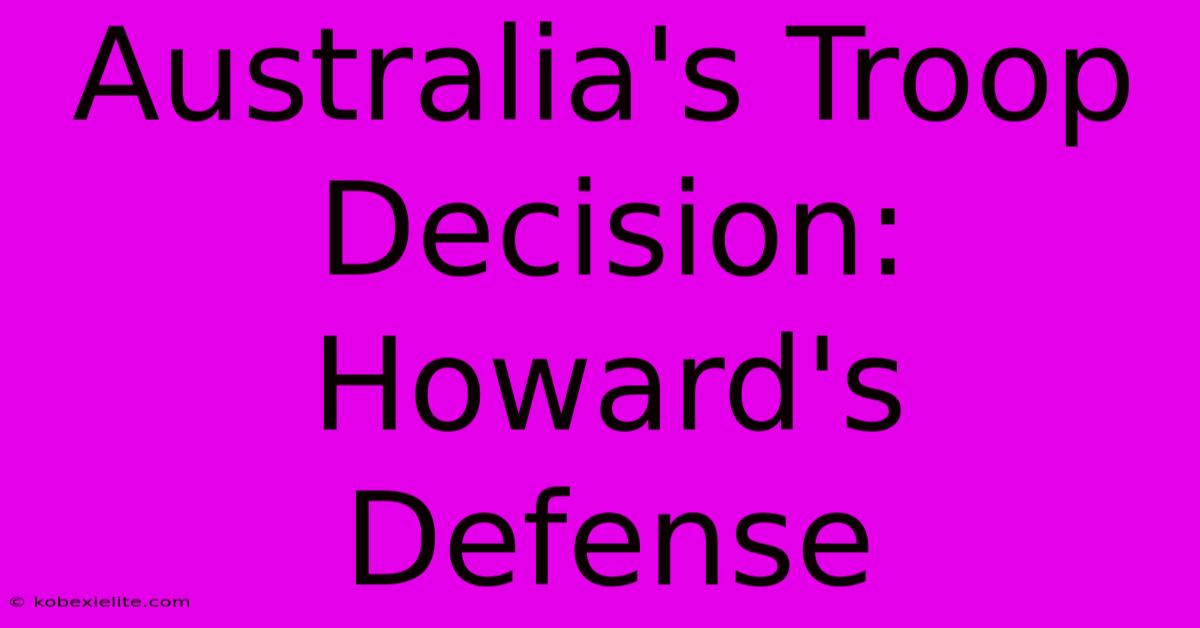Australia's Troop Decision: Howard's Defense

Discover more detailed and exciting information on our website. Click the link below to start your adventure: Visit Best Website mr.cleine.com. Don't miss out!
Table of Contents
Australia's Troop Decision: Howard's Defense – A Legacy of Controversy
John Howard's decision to send Australian troops to Iraq in 2003 remains one of the most contentious issues in Australian political history. While staunchly defended by Howard and his supporters, the decision sparked widespread protests and continues to fuel debate about Australia's role in international conflicts and the responsibilities of leadership. This article will examine the arguments surrounding Howard's decision, exploring the context, justifications, and lasting consequences.
The Context: A Post-9/11 World
The decision wasn't made in a vacuum. The 2001 terrorist attacks on the United States profoundly shifted the global geopolitical landscape. Fear of terrorism, the rise of Islamic extremism, and the doctrine of preemptive war all played significant roles in shaping the international response to Saddam Hussein's regime in Iraq. Australia, a close ally of the United States, found itself navigating a complex web of alliances and international pressures.
The Bush Administration's Influence
The strong relationship between the Howard government and the George W. Bush administration is undeniable. This close alliance, built on shared values and strategic interests, significantly influenced Australia's decision-making process. Critics argue that Australia acted as a "loyal lapdog" to the US, neglecting its own national interests and independent assessment of the situation. Supporters, however, counter that Australia's commitment to the alliance was a crucial element in maintaining regional stability and security.
Howard's Justification: A Case for Intervention
Howard's government justified its involvement in the Iraq War based on several key arguments:
The Threat of Weapons of Mass Destruction (WMDs): A central pillar of the justification was the perceived threat posed by Saddam Hussein's alleged possession of WMDs. The intelligence supporting this claim was later widely discredited, fueling accusations of a flawed rationale for war.
Regional Stability: The Howard government also argued that removing Saddam Hussein would contribute to regional stability and prevent further acts of terrorism. This argument was linked to the broader "war on terror" narrative prevalent at the time.
Alliance Loyalty: Maintaining the strong alliance with the United States was presented as a vital national interest. Failing to support the US-led coalition would have had significant implications for Australia's strategic position in the region.
The Opposition and Public Backlash
The decision to deploy troops was met with fierce opposition both domestically and internationally. Large-scale protests took place across Australia, highlighting concerns about the legality and morality of the war, as well as the potential for Australian casualties. The lack of a UN Security Council mandate further fueled the controversy.
The Cost of the War: Human and Financial
The human cost of the Iraq War for Australia included the loss of life and the physical and psychological impact on soldiers who served. Beyond the human cost, the financial burden of military involvement also drew criticism.
The Legacy of Controversy
The Iraq War remains a highly divisive issue in Australia. While Howard maintains his decision was justified, many Australians continue to question the wisdom and morality of the intervention. The controversy highlights the complexities of international relations, the limitations of intelligence, and the importance of careful consideration of the consequences of military action. The long-term impact on Australia’s international standing and its relationship with the US also remains a subject of ongoing debate.
Keywords: John Howard, Iraq War, Australia, troop deployment, George W. Bush, weapons of mass destruction, WMD, regional stability, alliance loyalty, war on terror, public opinion, political controversy, international relations, Australian foreign policy.

Thank you for visiting our website wich cover about Australia's Troop Decision: Howard's Defense. We hope the information provided has been useful to you. Feel free to contact us if you have any questions or need further assistance. See you next time and dont miss to bookmark.
Featured Posts
-
Wild Pay Gap Gen Z And Boomers
Jan 01, 2025
-
2025s First Polar Vortex Freezing Temperatures
Jan 01, 2025
-
Dakar Winner Toby Price Represents Australia
Jan 01, 2025
-
Cryptic New Year Message From Olmo
Jan 01, 2025
-
Black Knights Begin 2025 With Victory
Jan 01, 2025
